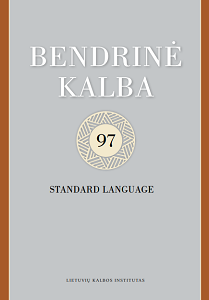Jakie to ładne, a takie szkudne – obraz kąkolu w polskiej kulturze ludowej
„This is pretty, but so damaging” – the Linguistic and cultural Image of Corncockle in Polish Folk Tradition
Author(s): Anna KaczanSubject(s): Customs / Folklore, Polish Literature, Western Slavic Languages, Cultural Anthropology / Ethnology
Published by: Lietuvių Kalbos Institutas
Keywords: corncockle; stereotype; linguistic and cultural image of the world; Polish folk culture;
Summary/Abstract: The article presents the linguistic and cultural image of corncockle, a plant that is categorized as a weed, a flower or a herb. The full version of the entry for corncockle (Polish: KĄKOL) will be included in the Dictionary of Folk Stereotypes and Symbols, the volume Mushrooms, Weeds, Plant Clusters, part VIII, edited by Jerzy Bartmiński and Stanisława Niebrzegowska-Bartmińska. In accordance with the assumptions of the cognitive definition, the folk image of corncockle was reconstructed on the basis of linguistic data (including various types of texts of folklore: proverbs, songs, belief stories, written peasant poetry) and the so-called co-linguisticata (i.e. records of beliefs and descriptions of folk practices: ritualistic, magical, or medicinal). The documentary material comes from the database of the Dictionary of Folk Stereotypes and Symbols, archived at the Jerzy Bartmiński Ethnolinguistic Unit, UMCS, Lublin.
Journal: Bendrinė kalba (iki 2014 metų – Kalbos kultūra)
- Issue Year: 2024
- Issue No: 97
- Page Range: 97-114
- Page Count: 18
- Language: Polish

